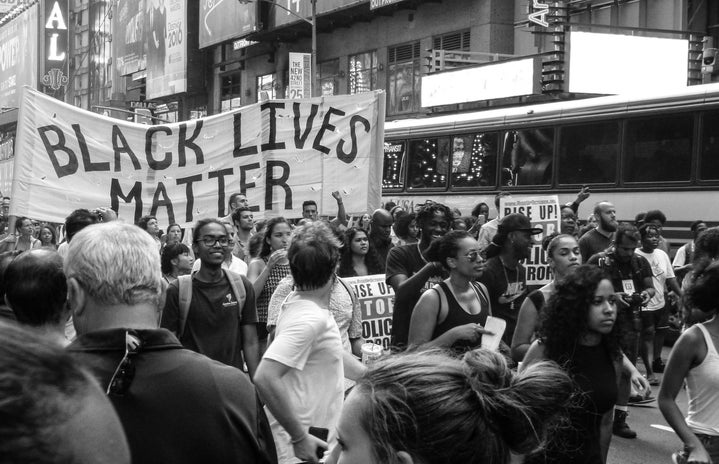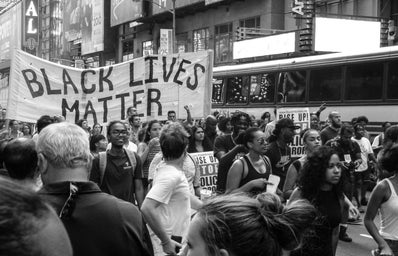In elementary school, I “learned” about civil rights. In kindergarten, I watched movies about Rev. Martin Luther King Jr.’s celebrated “I Have A Dream” speech and Rosa Parks’ valiant refusal to move to the back of the bus. In middle school, I haphazardly read Harper Lee’s To Kill A Mockingbird with my class, after a brief customary lecture on how the “n-word” is to never be uttered inside or outside of the classroom. In high school, I analyzed the rhetoric of King’s “Letter from a Birmingham Jail” for AP credit. I am privileged enough to say that the extent of my struggle with the civil rights movement started and ended with groaning over an incorrect quiz or test question on the subject material. I am privileged enough to have “learned” about civil rights in the comfort of a classroom that my parents paid tuition for.
On May 25, 2020, George Floyd was murdered by Officer Derek Chauvin in Minneapolis, Minnesota after a deli clerk suspected that he purchased a pack of cigarettes with a counterfeit $20 bill. Floyd was then murdered through excessive force by police.
The news of Floyd’s murder was met internationally with blatant disgust and despair; millions of Americans mourned the loss of Floyd through extensive protests and riots continuing for days in all fifty states. Floyd’s death once again catapulted the Black Lives Matter movement to the forefront of American politics. It opened the eyes of millions to the cruel reality that black Americans experience firsthand: the murder of Floyd is a direct consequence of systematic racial bias and discrimination that has always been deeply rooted in American culture.
For years, the media has covered the deaths of innocent black Americans, such as Trayvon Martin, Eric Garner, Breonna Taylor, Sandra Bland, Ahmaud Arbery, and now George Floyd, all of which were met with public backlash and cries for reform before slowly being phased out of news cycles. The United States prides itself in its alleged exuberance of American exceptionalism, the idea that the United States in an innately virtuous nation unlike any other. So why don’t we act like it? Why does it take the deaths of countless innocent Americans to see a need for change? Why does it take riots to see the value and importance in passive forms of activism?
It is clear to say now more than ever that the systematic racism that millions of black Americans are subject to has never been a political issue; it has always been a human rights issue. As a nation, we need to listen and learn in order to see any true change. It goes beyond posting a black screen for #BlackoutTuesday (which when not supported by any further means of action for the cause clearly constitutes as “slactivism”). It means that we need to educate ourselves, stop silencing and putting words into the mouths of those who are suffering. We need to call out others on their implicit bias and racism. We need to have those uncomfortable conversations about race, and hold ourselves accountable for our words and actions. We need to sign petitions and see them through. We need to support black-owned small businesses. We need to stand with those directly affected by systematic racism and use our blatant privilege to stand with and support them. We need to change the systems that were never created to support black people in the first place.
It would be ignorant of me to say that I ever really “learned” about civil rights. It would be ignorant of me to say that I understand the pain and anguish that black people are feeling right now. It would be ignorant of me to try to lecture someone on civil rights issues as someone who has never truly experienced it firsthand. It would be ignorant of me to say that I am completely educated on the subject matter, although I am learning. I understand that I will never understand the pain that black communities in America feel, especially in times like these. I understand that while this is not about me, my voice matters. I know understand that I will never be the subject of the deliberately hateful, gaslighting rhetoric delivered by politicians in this country. I understand that I should be stating the obvious here: It’s time that as a nation we listen to and understand one another to truly fight for a change.
“You never really understand a person until you consider things from his point of view… until you climb into his skin and walk around in it.”
-Harper Lee, To Kill a Mockingbird
Where to sign/donate:
Black Lives Matter Updates/Resources
GoFundMe- Official George Floyd Memorial Fund
Where to learn:
TEDTalk: An Interview with the Founders of Black Lives Matter
Free Yale Course on African American History: From History to Present
Where to register to vote:
https://www.vote.org/register-to-vote/



